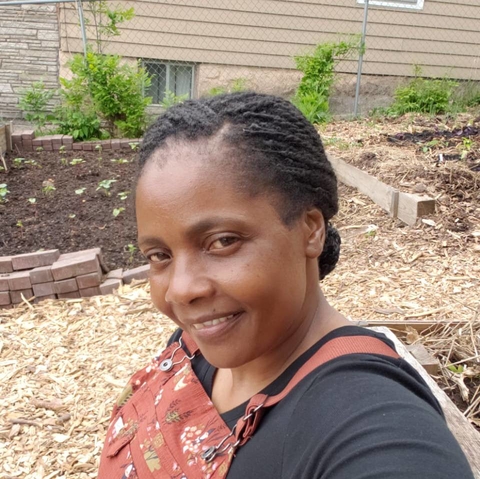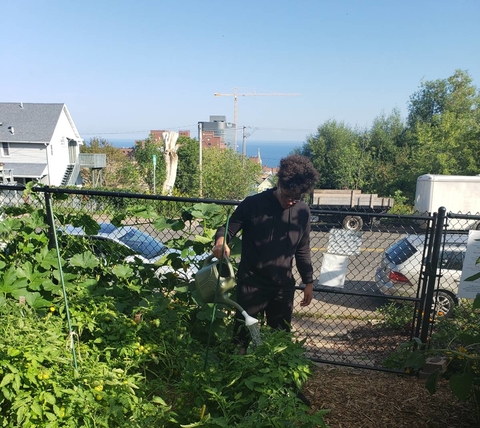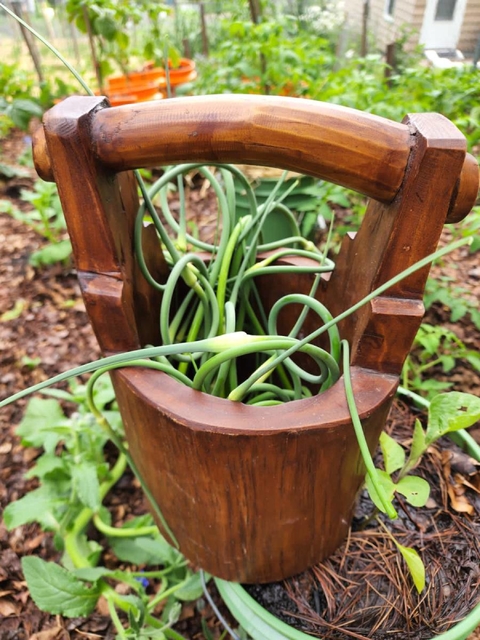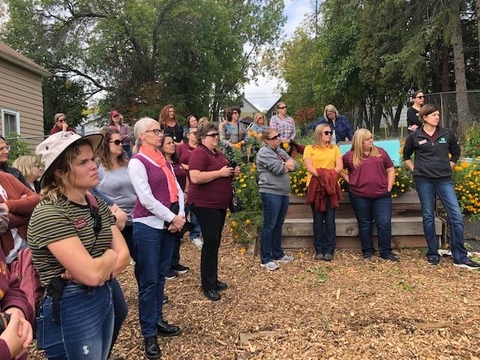Growing back to the beginning with Rumbi Masawi and the Giving Garden
Jul 26, 2023 08:16AM ● By Editor
July 25, 2023 from the University of Minnesota Extension
In Duluth, Minnesota’s Hillside neighborhood, residents have a life expectancy of 11 years less than those living in other Duluth neighborhoods. It’s a harsh truth ingrained in the backdrop of a proud, growing community. Since sprouting up in Fall 2020, the St. Mark Giving Garden has sought to change that landscape.
The free, public garden is open to anyone looking to learn more about planting, connecting with the local community or simply enjoying a healthy snack. Garden leadership says they aim to improve health and well-being in the neighborhood by targeting disparities created by generations of systemic racism. This means creating space for community members, especially those with African heritage, and providing opportunities for healthy food, connection, economic growth and healing.
Two local organizations — St. Mark AME Church and Health Equity Northland — are at the core of the collaboration. Also providing support through funding and expertise are the University of Minnesota Regional Sustainable Development Partnerships (RSDP) and the Clean Energy Resource Teams. Rumbidzai “Rumbi” Masawi, one of the program leaders and NE RSDP board member, credits RSDP with initially connecting her to this community.
“Coming to Northeast Minnesota from Zimbabwe, at first I hibernated because it was so cold! But I was looking for opportunities to connect with the African American population. In those years, I never met any, and I wondered, ‘Are they not here?’” recalls Masawi with a laugh. “But through my work as an RSDP board member, I got to know the Giving Garden community.”
After volunteering with the garden, Masawi became Lead Gardener. Then she was eventually hired on as Program Director for Health Equity Northland. When asked about her connection to the garden, Masawi shares her story from the beginning - the very beginning.
A different way of knowing
Growing up in Zimbabwe, Masawi witnessed the long-term impact of cultural disruptions. Like many others in her native country, she grew up between two worlds, her family’s urban home and her extended family’s rural home. She remembers spending some summers learning about the land from her grandmother and returning to the city to attend school every year.
“Before the colonial era, people lived in villages. They grew their own produce and that was their form of subsistence. There was no need for money,” says Masawi. “But when colonization came, people then had to leave their homes to work for money. In turn, that led to industrialization and the creation of urban areas.”
As an adult, Masawi built a career in the fast-paced world of aviation. But after 8 years she found she was longing for something a bit more down to earth. She decided to explore the field of sustainability research. It was a path that enabled her to engage at the highest levels.
“I met my president, the minister of environment, and various diplomats. But what I discovered is that higher bodies of power often function like a bulky, inefficient ship,” she says. “Action is slow to permeate down and the average person may not see the impact.”
“I remember at one point I went to visit villages in India for a summer. We were encouraged to eat what locals eat, to sleep where they sleep. That's when I really got to know different ways of knowing,” recalls Masawi. “I thought about my home. I realized how our elders were truly very knowledgeable. But ‘civilization’ had really ignored that way of knowing. That created the ecological crisis that we are having today.”
Masawi says through those experiences, she felt her roots urging her to retrace her steps back into that ancient knowledge. She decided to shift her career toward sustainable development practice. Joining her husband, she eventually found herself in Northeast Minnesota. Despite being so far from Zimbabwe, Masawi says she feels at home nurturing the land and growing organically alongside her Hillside neighbors.
“At the Giving Garden, we are we. We can wait forever or we can do something as a community. We can work and spread a message from the grassroots up.”
Deep rooted history
During the growing season, the St. Mark Giving Garden boasts collard greens, okra, tomatoes, sweet peppers, eggplants, onions, garlic, carrots, sugar snap peas, bush beans, culinary herbs, and pollinator plants, to name a few. With such a bounty, one might be surprised to learn the garden rests on a historically rocky and hardscrabble piece of land.
Working alongside the community, the garden founders came together to make the land fit for life. Now they feel the key to the project is to demystify the art of gardening for the Hillside community. In the community plot, you won’t find specific crops segregated into corners or straight rows. Masawi says the garden takes a more authentic approach.
“In the beginning, our ancestors knew to simply mimic the natural. In our garden, like in a forest, there is biodiversity and companion planting. The plants do very well because they complement each other. This is the wisdom of our elders.”
It serves as an apt metaphor for what garden leadership hopes to help the Hillside community achieve. Understandably, some African Americans in Hillside hold mixed emotions toward planting. Community members have shared those feelings, noting that they associate gardening with the bleak history of American slavery. It’s another rocky landscape that the garden hopes to help mend and rebuild as a tool of community sovereignty.
“The garden founders came together and decided we are going to heal this land,” says Masawi. “The Giving Garden is not only for planting, it's also for healing. It's a place to reconnect with the land. It's a place to reconnect with culture.”





